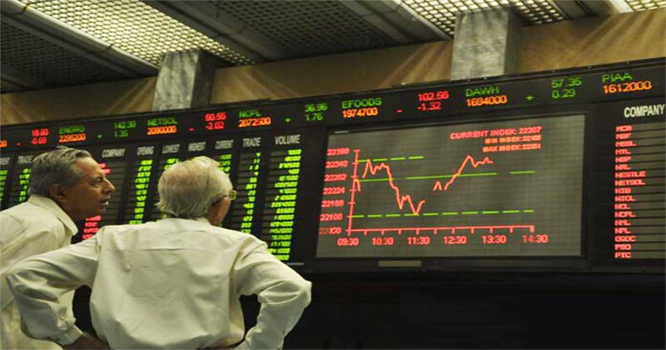PSX Faces Decline Amid Escalating Global Trade Tensions and Falling Oil Prices
ISLAMABAD: The Pakistan Stock Exchange (PSX) experienced a significant slump on Tuesday, as global trade tensions, a sharp fall in crude oil prices, and major foreign capital outflows weighed heavily on investor sentiment.
The benchmark KSE-100 Index closed at 111,935.38, down by 809.63 points (-0.72%), after fluctuating between a high of 113,649.07 and a low of 111,828.10 during the day. The decline was primarily attributed to the escalating Sino-US trade war, coupled with concerns over global market instability and political uncertainty within Pakistan.
Ahsan Mehanti, CEO of Arif Habib Commodities, highlighted the primary factors contributing to the bearish market trend, including fears surrounding the ongoing global trade war, a significant slump in global crude oil prices, and mounting foreign outflows. “The combination of political noise, rupee instability, and foreign capital flight led to the widespread selloff,” Mehanti said.
The market was rattled by China’s decision to impose tariffs on US imports in retaliation to new US duties on Chinese goods, reigniting tensions between the world’s two largest economies. The renewed trade war raised concerns about global trade disruptions, which could affect corporate earnings worldwide and, in turn, investor confidence.
Adding to the unease, Pakistan witnessed a net outflow of $32.4 million from Treasury bills as of January 24, indicating a decline in foreign interest in Pakistani bonds, especially following a cut in interest rates. The State Bank of Pakistan (SBP) recently reduced the key policy rate by 100 basis points to 12%, which is expected to ease inflation but also raises concerns over falling bond yields and reduced foreign investments.
However, despite the market’s volatility, Pakistan secured a major relief when it signed an agreement with the Saudi Fund for Development on Monday, deferring $1.2 billion worth of oil payments for a year. This move is expected to provide some respite to Pakistan’s external accounts and foreign exchange reserves.
Meanwhile, inflation in Pakistan saw a significant drop, with the Consumer Price Index (CPI) falling to 2.4% year-on-year in January 2025, the lowest level in over two years. This marks a considerable improvement from the 4.1% recorded in December 2024 and a sharp contrast to the 28.3% inflation rate in January 2024. While the decline in inflation has raised expectations for more monetary easing, analysts remain cautious due to ongoing global economic uncertainties and local currency fluctuations.
Read More: Global Stock Markets Plunge as Trump Imposes Tariffs, Fears of Trade War Escalate
The day’s market performance underscores the growing concerns among investors over the impact of international trade disputes and domestic economic instability on Pakistan’s financial markets.





Comments are closed, but trackbacks and pingbacks are open.